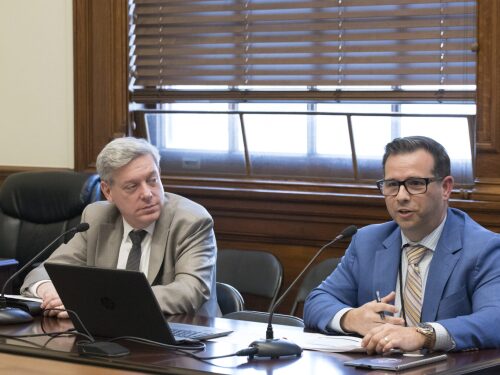More than half of Rhode Island state government’s IT workforce are contractors, Department of Administration (DOA) Director Jonathan Womer told the Senate Committee on Finance during a hearing on Tuesday afternoon.
“That’s not an ideal situation,” Womer said.
Now Rhode Island’s state IT department thinks it’s time for a little spring cleaning: It’s asking the General Assembly to approve 15 new full-time hires for fiscal year 2026 to replace contractors with in-house talent.
Womer appeared before the Senate committee to testify on budget amendment #10 from Gov. Dan McKee that would add the 15 positions to the DOA’s technology arm, the Division of Enterprise Technology Strategy and Services (ETSS).
The request is budget-neutral, Womer said, as an internal service fund would subsidize the new hires. Rather than draw from general revenue, the Information Technology Internal Service Fund grows from billing other state agencies for IT services they use. A complementary budget amendment #9 details how state agencies are charged for enterprise technology, with leftover project funds going into a restricted receipt account.
“We’re not asking for any more money for this,” Womer said. “We’re going to make sure absolutely that this pays for itself.”
Womer added his agency looked inward when servers holding the state’s public benefits eligibility system were breached last December, compromising and leaking the personal information of an estimated 657,000 Rhode Islanders. The system, RIBridges, was built and continues to be maintained by state contractor Deloitte, which never sent a representative to any of McKee’s numerous press conferences about the breach.
“One of the many things we did when we looked at the RIBridges incident was take a look at institutional and strategic things that we could change to make our IT system stronger,” Womer said, “and one of those we looked at pretty heavily is making more of our IT personnel state employees.”
Brian Tardiff, the state’s chief digital officer and head of the enterprise technology division, testified beside Womer, describing an IT agency whose reliance on contractors goes well beyond the spectacular example of the RIBridges breach.
There are 382 IT personnel who work for the state right now, Tardiff said. Of the 193 contractors, only 40 are working short-term assignments that will end when their contracts do. The remaining 153 workers provide daily operational support — something the state wants to bring in-house.
We’re not asking for any more money for this. We’re going to make sure absolutely that this pays for itself.
“The remaining balance is on full time to support normal IT operations in critical leadership roles and critical functional areas,” Tardiff said. “Compounding our challenge, within the next 48 months, we’re looking at a 33% attrition rate through retirement of the workforce.”
That’s why the state needs “the agility to produce job classifications that represent a modern workforce,” Tardiff said. McKee’s budget amendment would achieve that by stripping away some usual formalities involved in the state hiring process, including public hearings and other rounds of approval needed to change job classifications and pay scales. Womer explained that revising a job description can take up to nine months.
“Sometimes nine months in the IT world, things have changed completely,” Womer said.
Topping Tardiff’s wishlist for his department are an RIBridges technical lead, a security analyst, and project delivery management to improve coordination of major IT initiatives across agencies.
Tardiff told lawmakers the average cost of a contractor is $260,000 to $280,000 per year, while the proposed full-time staff would cost around $240,000, including benefits. Ideally, some contractors could be brought in-house, which would also enlarge the state’s pension fund, Tardiff said.
A ‘refreshing’ ask
Sen. V. Susan Sosnowski called the pivot from contracted labor “refreshing.”
“Sometimes I feel like it’s a sense of déjà vu, because I could remember years ago in the Finance Committee, how we were told it was the best thing to have contractors and so forth versus employees,” Sosnowksi said.
Freshman Cranston Democratic Sen. Lammis Vargas was so eager to ask about the 15 IT hires that she mistakenly directed her question at the afternoon’s first presenter Richard Charest, head of the Executive Office of Health and Human Services.
Charest answered anyway: “I’d love to have 15 FTEs,” he said with a smile, drawing laughter from the audience and committee alike.
Once Tardiff and Womer sat down, Vargas picked up where she left off, and questioned Tardiff about high turnover in the department. Only 172 of 189 state IT positions are filled, Tardiff said, and despite actively recruiting for eight more hires, turnover is constant, with the number of vacant slots mercurial.
“That number fluctuates almost monthly,” Tardiff said. “Last month it was five. I had three personnel retire this month. So now it’s eight.”
“Might be tough for you to answer, but how long do you foresee filling these in?” Vargas asked.
“There’s always going to be five or six [vacancies] for that volume of personnel,” Womer replied. “We’ll have that number of vacancies at any given point in time…We thought we could successfully do 15 in the next fiscal year, which is the reason we only asked for 15.”
Vargas was also concerned that the request is not genuinely cost neutral.
“With the contractors, we’re not paying health insurance,” Vargas said.
Womer acknowledged there might be individual differences in pay rates for individual contractors, adding retention over time could complicate compensation for future years. But he was firm that the measure will pay for itself.
Chair Lou DiPalma replied playfully to Vargas, “Senator, we’re not giving them any more money.”
This story was originally published by the Rhode Island Current.










